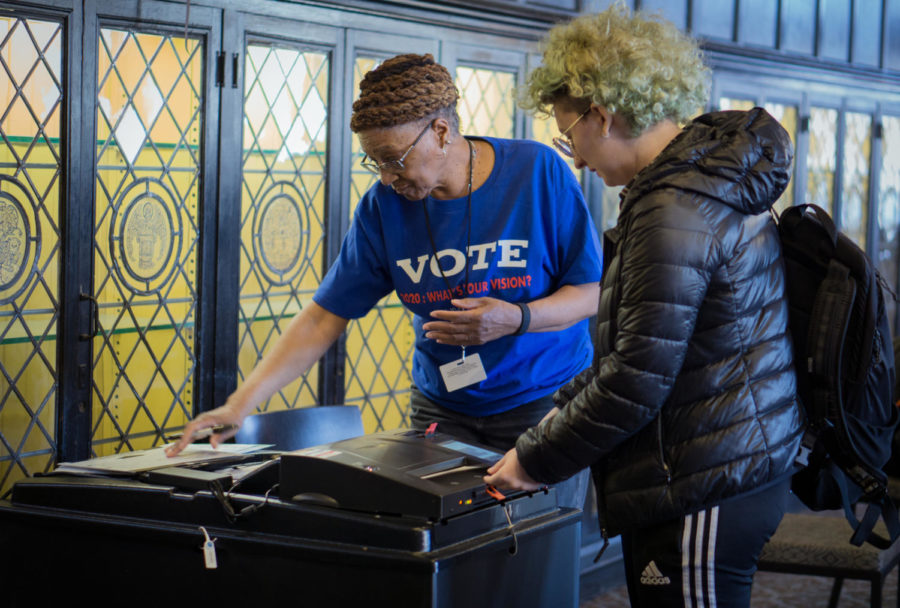How can we save American democracy?
This was the big question looming over a panel titled “Presidential Elections and the State of Our Democracy,” organized by the Democracy Solutions Project and hosted at the UChicago Center for Effective Government (CEG) on October 23. A group of expert panelists, including journalists, a professor, and an election lawyer, discussed their thoughts on what threat former President Donald Trump poses to democracy, systematic flaws built into the Constitution, and how Americans can find ways to reform the system for the better.
Moderator Sasha-Ann Simons of WBEZ opened the discussion by asking William Howell, Sydney Stein Professor in American Politics and future Dean of the Johns Hopkins School of Government and Policy, about whether the candidates in the 2024 presidential election reflected the views of the American people.
Howell argued that party leaders, members of Congress, donors, and other high-level players in government are more ideologically polarized and antagonistic toward political opponents than most Americans, a pattern he described as “elite polarization.”
“The disagreement that we see among political elites is not the same as the levels of disagreement that we see among much of the electorate,” Howell said.
Amy Gardner, national reporter at The Washington Post and current CEG fellow, pointed out that while there are very few undecided voters left, many people have expressed a desire for “another choice.”
The panelists also expressed their concerns about Trump attempting to disrupt the electoral process in 2024.
Gardner mentioned that while election safety is a genuine risk, she thought it wasn’t a major cause for concern in the upcoming election. “The manner in which we all cast our ballots in the States is generally secure,” she said. “I think that this is going to be a secure and fair and free election.”
Adav Noti, the executive director of the Campaign Legal Center, argued that the real concern lies with politicians who know that elections are free and fair but choose to take legal action anyway. “They’re not saying it because they’re true or that they believe it. They’re saying it for political gain,” he said. “It appears to succeed, at least in some segments of the voting population.”
Lynn Sweet, Washington Bureau Chief of the Chicago Sun-Times, said a lack of understanding of our legal systems means that politicians like Trump are able to claim that their election lawsuits were not heard when they were in fact dismissed for lack of evidence. “The way Trump communicates depends on people not knowing how things work,” she said.
Noti pointed out that while safeguards have been added to the system—such as a reform of the process of congressional certification of electoral votes through the 2022 Electoral Count Reform Act—she thought damage could still be done on the state level through various legal avenues.
The panelists also expressed concerns about what might happen in a second Trump term. One frequent point of reference was Project 2025, a document produced by the Heritage Foundation think tank providing a plan for the next Republican president to implement conservative priorities such as cuts to Medicare and Medicaid, restricting abortion and contraception access, and defunding the Department of Education. Trump has tried to distance himself from the plan, while Democratic nominee Kamala Harris has attempted to tie him to Project 2025.
Howell argued that the biggest danger that Project 2025 poses is the politicization of the federal government by reclassifying thousands of civil servants under Schedule F, which means they serve at the pleasure of the sitting president.
“It can corrode the function of the agency that leads to the underperformance of the agency,” he said. “You can’t fathom a healthy, well-functioning democracy without having a government that cannot just write laws but implement laws that attend to the wishes and wants of a populace. And so, this attack on the administrative state is an attack, in my view, on democracy itself.”
Even without control of the House and Senate to implement many of the suggestions of Project 2025, Sweet said that the ideas presented in the plan are “very similar when you look at some of the concerns of what we’re loosely calling the MAGA-aligned voters,” arguing that the Republican grassroots is now aligned with the same proposals that appear in Project 2025.
While most of the conversation was characterized by concerns over the future of American democracy, the panelists all suggested pathways towards institutional reform and how those changes might take place. Multiple panelists mentioned ranked-choice voting, which allows voters to rank multiple candidates on their ballots, as an electoral reform worth considering.
Howell also mentioned compulsory voting, a feature of Australian elections, as a way to get more people engaged in the process, noting that the U.S. has far lower turnout than many of its peer democracies.
Noti, when asked about how to get Americans excited about electoral reform, argued that “the voters need to say we are not going to tolerate the sorts of candidates that we’re seeing now who want to make the system worse rather than better.” He noted that, in 2022, many candidates who openly ran on Trump’s claims of electoral fraud were rebuked by voters. “If that happens again this year… there should be a realization that there is real interest in the voting public in making the system better and not worse.”










Marked safe from TDS / Nov 4, 2024 at 7:56 pm
This is an opinion piece, not news.